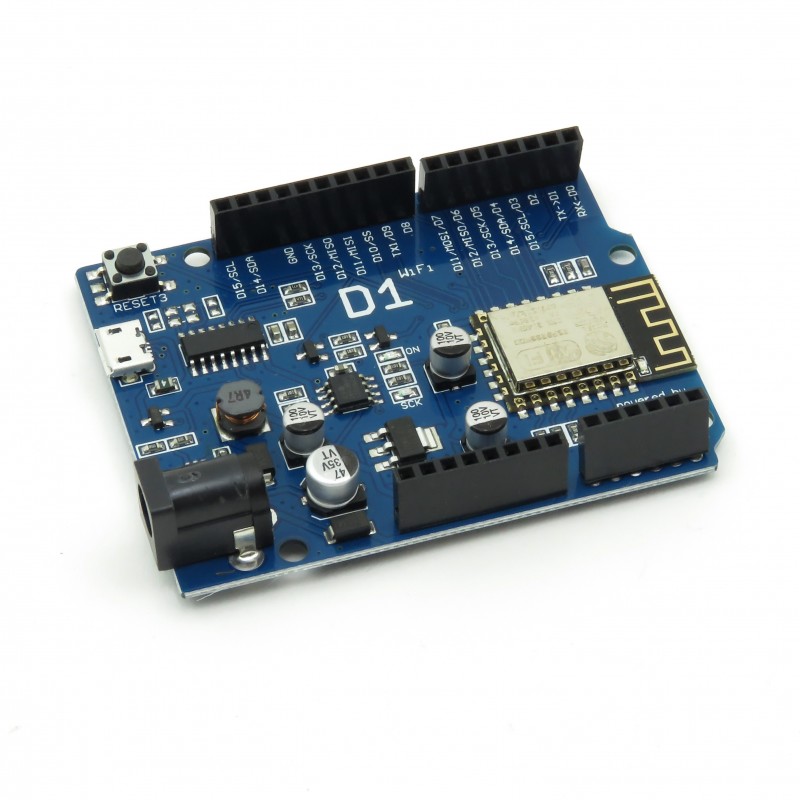




zł20.58 tax excl.
Development board with dimensions and spacing compatible with Arduino Uno R3. It have built-in Wi-Fi ESP8266 module. The device is compatible with WeDOS D1, it can be programmed from the level of Arduino IDE
Description
The development board allows for integration with Wi-Fi module (ESP8266) which is known for its simplicity and considerable capabilities with overlays (shields) with a spacing of connectors compatible with Arduino UNO R3 giving a lot of opportunities for the development of the IoT project. The board is compatible with WeMos D1 and NodeMCU.
Data sheet
Manufacturer BTC Korporacja sp. z o. o. Lwowska 5 05-120 Legionowo Poland sprzedaz@kamami.pl 22 767 36 20
Responsible person BTC Korporacja sp. z o. o. Lwowska 5 05-120 Legionowo Poland sprzedaz@kamami.pl 22 767 36 20
USB cable (type A) - microUSB (type B) used to connect the computer with devices equipped with microUSB-B sockets. Length: 1m
The 10 W AC adapter provides 5 V and 2 A current. It is equipped with a 1 m cable with microUSB plug. Akyga AK-TB-23
No product available!
This ESP8266-based development board is designed for rapid IoT application development. It features support for two Grove Plug-n-Play connectors, digital and analog I/O, and UART and I2C interfaces for connecting multiple sensors and modules. The device supports OTA firmware updates, a RESTful API, and integration with mobile apps and IFTTT, allowing for easy remote control and monitoring. Seeed Studio 102110057
Evaluation set designed for the use of Internet of Things based on ArduCAM-Mini-2MP and ArduCAM-ESP8266-Nano-V2 modules. ArduCAM-Mini-2MP is a module with a 2 megapixel camera with an OV2640 transducer and an ESP8266 chip. Mounting the M12 lens. ArduCAM B0085
Plate for applications in the area of Internet of Things (IoT). The module was based on the ESP8266 system, which integrates WiFi, TCP / IP communication, 32-bit MCU, 10-bit ADC and many interfaces such as HSPI, UART, PWM, I2C and I2S. DFrobot DFR0489
WiFi module based on ESP8266. It has an embedded antenna and 0.96 "OLED display. The module can be programmed in Lua (under NodeMCU firmware control) or in the Arduino IDE. Provides 12 GPIO lines.
E-Paper ESP8266 Driver Board is a universal driver board for e-Paper displays. The board is based on the WiFi ESP8266 module. e-Paper ESP8266 Driver Board
LoLin NodeMCU V3 is a board with ESP8266 (ESP12E). The ESP8266 system provides WiFi connectivity (802.11 b / g / n). The USB-UART converter (CH340G chip) is located on the board. The module can be programmed in Lua (under the control of the NodeMCU firmware) or in the Arduino environment. There are 10 GPIO lines available.
Development board D1 Mini with WiFi module ESP-8266MOD and 4 MB Flash memory. The module can be programmed from the Arduino IDE level. WeMos D1 Mini
BMP180 temperature / pressure sensor module compatible with WeMos D1 mini board.
Development board D1 Mini V3 with WiFi module ESP-8266 and 4 MB Flash memory. The module can be programmed from the Arduino IDE level. WeMos D1 Mini V3.x
WiFi module developed by AI-Thinker Co., Ltd with ESP8266 processor. Integrates a 32-bit MCU microcontroller with 80 MHz clock, RTOS support, Wi-Fi and antenna. The module supports the IEEE802.11 b / g / ni standard and has a complete TCP / IP protocol stack. AI-Thinker ESP-12S
Development kit with WiFi / Bluetooth module ESP8266 and 0.96 "OLED display.
Development board D1 Mini Pro with WiFi ESP8266 module and 16 MB Flash memory, equipped with ceramic antenna and external antenna connector. The module can be programmed from the Arduino IDE level. WeMos D1 Mini Pro
WiFi 802.11 b/g/n module with ESP8266 chip, there are 8 pins with UART and GPIO interface. Built-in PCB antenna. SparkFun WRL-17146
Development board with the ESP-WROOM-02 WiFi module. The board has a USB-UART converter, a basket for a Li-Ion 18650 battery and a charging circuit
A set with environmental sensors that allows you to measure air pollution and noise and visualize data on a dedicated platform. Seeed Studio 102110258
No product available!
WiFi module with ESP8266 designed to work with the Raspberry Pi Pico. It communicates via the UART interface using AT commands. Waveshare Pico-ESP8266

Development board with dimensions and spacing compatible with Arduino Uno R3. It have built-in Wi-Fi ESP8266 module. The device is compatible with WeDOS D1, it can be programmed from the level of Arduino IDE
